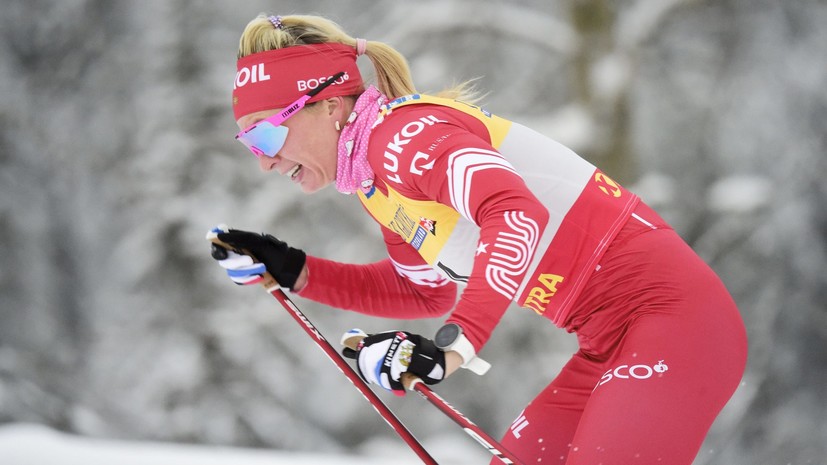Sorina's first success and the fall of Nepryaeva
Tatiana Sorina took second place in the ski mini-tour at the first stage of the World Cup in the Finnish Hand.
She finished behind Teresa Johaug and won a medal at this level for the first time in her career.
Another Russian woman Natalya Nepryaeva showed the tenth result.
The final line-up in the mini-tour, which resulted in twice as many cup points as compared to regular races, was determined by the results of a 10-kilometer skating pursuit race.
The athletes started in accordance with the results of the past two days, and both Russians were contenders for the prizes.
Nepryaeva started 16 seconds after Johaug, Sorina was losing three seconds at first.
From the very beginning, the Russians united into one group with the closest pursuers from Sweden.
Among them were both pure sprinters Maya Dalkvist and Lynn Swan, who wore the yellow jersey of the World Cup leader, and the very dangerous distance driver Frida Karlsson.
Together they worked the first kilometers, on which Nepryaeva sometimes caught a gap, but she always came back.
The girls did not try to catch up with Johaug and saved their energy for the finish.
This allowed two more skiers to join their group - the Swede Ebbe Andersson, who had taken the medal from Sorina the day before, and the experienced American Rosie Brennan.
Their group of seven people had to play two prizes on the last lap, when suddenly there was a blockage on the track.
Nepryaeva, Svan and Dalkvist were in the snow.
The Russian woman broke her ski and got a leg injury.
They not only fell behind, but also let several rivals go ahead, who no longer expected to be in the top eight.
Sorina did not wait for the final showdown and did an excellent job in the last ascent, since it was much easier to overcome it with a skate ride than in the two previous races.
She crossed the finish line 47 seconds after Johaug, preventing Andersson and Karlsson from hoping for silver.
After the race, the Russian woman noted that she was pleased with her performance.
“Everything that was planned was successful.
We set the task to go with the leaders, we worked our way up, everything succeeded.
Rivalry with Andersson?
During the entire race, they stepped on each other's skis, the track was very narrow, we constantly contacted the skis, ”Sorina told Match TV.
Sorina, who has never won a World Cup medal before, earned 160 ranking points and moved up to second place overall.
Nepryaeva finished tenth in the race.
Yulia Stupak, who took 21st place in the mini-round, and Alisa Zhambalova were also in the top thirty.
Bolshunov's second place in the race and World Cup
The formation before the start of the men's pursuit did not give the Norwegian skiers a clear advantage.
Johannes Klebo started first with a 26-second lead from Alexander Bolshunov, but the Russian could well have had 15 km to get ahead.
However, Emil Iversen could have prevented him, ready for the sake of his compatriot to restrain the winner of the World Cup.
With each lap, Bolshunov reduced the gap from Klebo and by the middle of the distance he was finally able to lead the race, leading two Norwegians.
The example of Nepryaeva showed that it was quite dangerous to move three of us on the narrow Ruki track.
Bolshunov sometimes attempted to break away on the rise, but Iversen held back the Russian's advance and at the same time dragged Klebo with him.
The Norwegians' plan to win the race at the expense of Bolshunov worked once again.
On the final ascent, Klebo increased his speed to the limit, and the Russian could only restrain Iversen in order to at least stay with the silver.
At the summit, the leader of the race turned back to see that Bolshunov would no longer pose a danger at the finish line.
For the second time in a day, the Russian athlete won the silver medal in the mini-tour, although, unlike Sorina, Bolshunov had a real chance of winning.
No less interesting from the very beginning of the race was the struggle for the closest prizes.
Six skiers started 16 seconds apart, including Alexei Chervotkin, Ilya Semikov and Evgeny Belov.
The latter immediately began to work to catch up with Chervotkin and form a dense group of pursuers.
Together with Iivo Niskanin and Briton Andrew Musgrave, Belov achieved his goal.
Later, the four were joined by the Norwegian Hans Christer Holund and the Russian Andrey Melnichenko.
In the course of the last lap, the pursuers reduced the gap from the leaders to 18 seconds, but still did not reach the medals.
At the last moment, Holund made a leap, and the Russians did not have enough strength to keep Niskanin and Musgrave at the same time.
Chervotkin, Belov and Melnichenko took places from seventh to ninth, and the latter became the silver medalist of the race in pure time.

